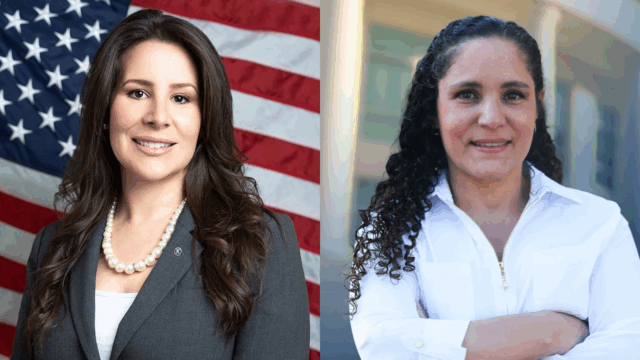A pair of Homestead Council seats were at stake Tuesday, and when the dust settled, just one of two incumbents is heading back to City Hall.
For Seat 5, sitting Council member Erica Ávila bested opponent Sonia Castro with 58% of the vote.
But in the race for Seat 1, challenger Kim Konsky beat incumbent Tom Davis, taking 56% of the vote to supplant him.
Each winner earned a four-year term.
And in a race for Vice Mayor, Council member Jennifer Bailey won both by vote count and by default; Davis was her opponent, and his loss meant he wouldn’t have been able to hold. But Bailey still beat him by more than 11 percentage points.
Four referendums affecting City Hall operations and bonding were also on the ballot. The results of those measures are below.
City Council, Seat 1
District 1 covers the northwest area of Homestead, between Southwest 195th Avenue on the west, 288th Street on the north, 152nd Avenue on the east and 312th Street (Campbell Drive) on the south.
Konsky, a 53-year-old Republican and lifelong Homestead resident, is a former agriculture insurance agent who now works in real estate.
Her campaign website listed community involvements that included memberships to the Homestead Women’s Club and Redland District Lions Club. She’s also volunteered with the Homestead Rodeo, Rotary Seafood Festival and Kiwanis Prayer Breakfast.
 (L-R) Council member Tom Davis faced a lone challenge from (and lost to) Kim Konsky. Images via Homestead and Kim Konsky.
(L-R) Council member Tom Davis faced a lone challenge from (and lost to) Kim Konsky. Images via Homestead and Kim Konsky.
Konsky’s No. 1 issue this election was traffic. She vowed, if elected, to work with state and local officials to address local roadway congestion. Other priorities included appropriately taxing developers, hiring more police officers, working with state officials to eliminate property taxes and improve the city’s cleanliness.
Davis, a 64-year-old private school teacher and veteran of the U.S. Armed Forces, sought re-election after winning a two-year stint on the seven-member Council in a 2023 Special Election.
He ran on a record of conservative policymaking that included, among other things, voting to impose a moratorium on high-density residential development, supporting the creation of a dedicated funding stream to enhance parks and roads, and passing legislation to give the city’s code compliance officials more discretion in citing illegal dwellings.
If re-elected, he promised to continue opposing “overdevelopment and high-density residential projects that increase traffic,” increase funding for public safety, promote job creation by attracting new businesses to Homestead and improve the city’s parks.
He carried an endorsement from Mayor Steve Losner, a fellow Republican.
City Council, Seat 5
Homestead’s fifth district covers a triangular section of the city’s northeastern corner, rising from Campbell Drive, that includes the city’s Waterstone and Malibu Bay communities.
Ávila, a registered Republican and Homestead resident since 2009, represented District 5 since her appointment to the Council in 2020. She won a full, four-year term the following year.
When not at City Hall, the 41-year-old works as a home mortgage loan originator.
As an elected official, she said she blocked high-density developments in the city, worked to complete Homestead’s first traffic master plan, attracted new restaurants and always voted for a balanced budget that didn’t increase the tax rate.
 (L-R) Council member Erica Ávila and challenger Sonia Castro. Images via Homestead and Sonia Castro.
(L-R) Council member Erica Ávila and challenger Sonia Castro. Images via Homestead and Sonia Castro.
She also touted several bread-and-butter political accomplishments, from expanding the city’s police force and establishing a childhood literacy program to advocating for filling potholes and restoring missing street signs.
If re-elected, she said she’d do even more to fix Homestead’s traffic issues, create more jobs, hire more police, work to reduce property taxes, update the city’s code enforcement, and cut government waste and red tape.
Her opponent, Castro, has lived in Homestead for more than two decades and spent a significant chunk of that time involved on the Waterstone Community Development District Board and as President of her homeowners’ association.
Her campaign site said she decided to run for office to stop “reckless overdevelopment,” lower taxes and fees for residents and work with Losner to “cut wasteful spending at City Hall.”
Referendums
Voters also answered four ballot questions on term limits, vacancies and bonding. The results:
— Referendum 1: Would extend the Mayor’s consecutive term limits from eight to 12 years, aligning it with limits already applied to City Council members (12 consecutive years or a combined 12 years in either office). Failed (23%).
— Referendum 2: Would change how vacant City Council seats are filled when at least one year remains in a term. Instead of electing whomever receives the most votes in a Special Election, a runoff election would be held between the top two candidates if no one wins a majority. Passed (68%).
— Referendum 3: Would authorize the city to issue up to $36.4 million in general obligation bonds, repaid through property taxes, to build and improve city parks, with bonds maturing in no more than 30 years. Failed (46.5%).
— Referendum 4: Allows the city to issue up to $39.6 million in general obligation bonds to fund roadway construction and improvements, also repaid through property taxes and capped at a 30-year maturity. Passed (53%).

